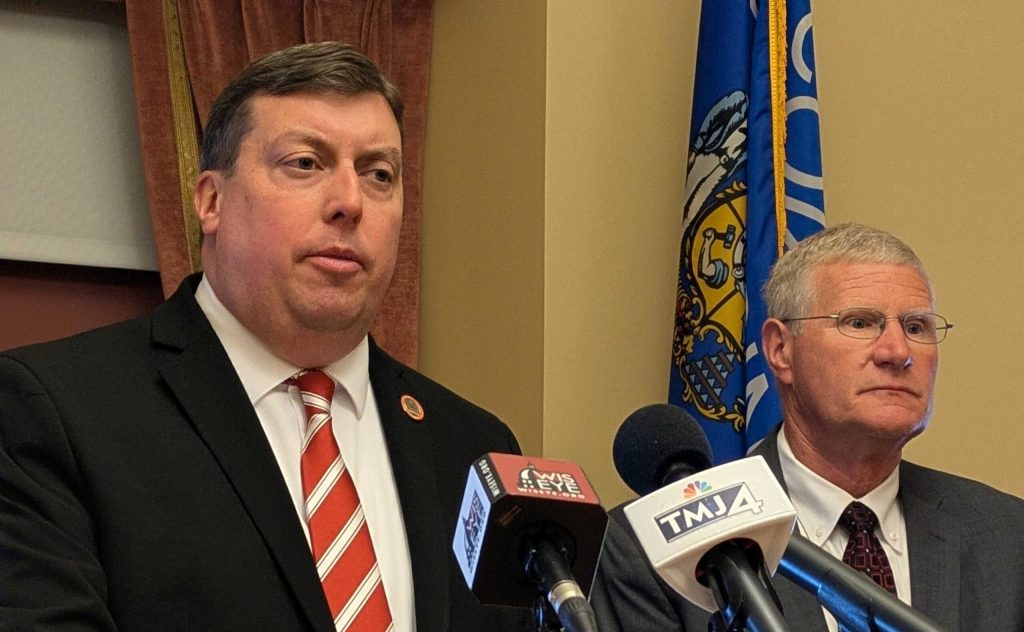Lawmakers Release Funds for Literacy But Delay Much of State Budget
Joint Finance Committee can't decide funding for UW system, Medicaid, child care.

Rep. Mark Born, R-Beaver Dam (left) and Sen. Howard Marklein, R-Spring Green, address reporters ahead of a meeting of the Legislature’s Joint Finance Committee at the Wisconsin Capitol on June 17, 2025. Born and Marklein cochair the panel. Shawn Johnson/WPR
Closed caucus meetings delayed the Joint Finance Committee meeting’s start half a dozen times throughout the day and into Friday night. When the GOP-held committee began its meeting shortly after 10 p.m. — more than 12 hours later than initially scheduled — it was notable that some of the biennial state budget’s most consequential issue areas were not on its agenda.
The committee did not take up the Department of Health Services — Wisconsin’s largest agency, which administers Medicaid.
It did not take up funding for the Universities of Wisconsin system, which has been a sticking point in negotiations between Gov. Tony Evers and legislative Republicans. Evers has requested $856 million while Republican Assembly Speaker Robin Vos, R-Rochester, says he wants to cut $87 million.
Nor did the committee take up the Department of Children and Families, under which childcare programs are housed. Evers has said he will veto any budget that does not adequately invest in childcare.
Joint Finance co-chair Mark Born, R-Beaver Dam, said these and other agencies not addressed on Friday, including the Department of Transportation and Building Commission, “will be taken up at a later date,” but he did not indicate when that would be, all but ensuring a budget deal would not be in place by the end of the fiscal year on June 30.
Here’s what lawmakers did on the budget Friday night:
Releasing Act 20 literacy money
Friday’s budget session was the first meeting of the committee since a unanimous Supreme Court found that Evers’ partial veto of a bill that would change how students are taught to read exceeded the governor’s authority. That court decision also found that the Joint Finance Committee was in charge of the $50 million allocated to implement that policy.
If not released by June 30, that money would have been returned to the state’s general fund.
Lawmakers voted unanimously Friday night to release $9 million into the Department of Public Instruction to go toward literacy coaching, as established under the sweeping reading bill also known as Act 20.
Any unspent money before the end of the fiscal year will return to the state’s general fund.
Despite lawmakers from both parties approving the release of the funds, they traded swipes over who was to blame for the delay, attached to a law passed in 2023.
“We want to help kids read … and unfortunately, it’s taken this Legislature a tremendous amount of time to allocate the funds for that, and ultimately that’s simply not acceptable, and we have to do better in the future,” said Rep. Tip McGuire, D-Kenosha.
JFC co-chair Born blamed the delay on Evers.
“We should, since you brought it up, remind folks that the reason for the delay was an unconstitutional veto by the governor,” he said.
No money for Knowles-Nelson land stewardship program
Among the larger agencies taken up Friday was the Department of Natural Resources, where lawmakers approved $87 million in total spending over the biennium for projects ranging from forestry and fire suppression grants to gypsy moth remediation.
Missing from the appropriations there was funding for the Warren Knowles–Gaylord Nelson Stewardship program, commonly known as Knowles-Nelson. The bipartisan land purchase program, named for former governors from both parties, lets Wisconsin’s Department of Natural Resources borrow money to buy land and set it aside for conservation programs.
But it was subject to a legal battle within the Joint Finance Committee, which ultimately ended with the Wisconsin Supreme Court determining that the committee was using its budgetary authority to improperly block stewardship projects.
Since then, Rep. Tony Kurtz, R-Wonewoc, who sits on the budget committee, has warned that Republicans have become cautious of the process.
In his budget proposal, Evers called for a billion dollars in funding for the program over the next 10 years. At $100 million per year, that would be a sharp increase from the program’s current level of state support, which is $33 million per year. On Friday, Democrats offered a motion requesting $830 million over that same time period.
Republicans did not include any funding for the program in their DNR package, which ultimately passed on party lines.
Instead, they pointed to a standalone bill in the Legislature, which would reauthorize the program at $28.25 million per year for four years. That amounts to a cut from current levels. The bill would also add new requirements onto the program, including requiring any projects over $1 million to be separately approved.
“We’ve met with so many different stakeholders, so many different groups, so many fellow legislators on getting this done. And we are committed to get it done,” Kurtz said of funding Knowles-Nelson. “It’s just, we want to do it right. We want to make sure all the stakeholders have a good feedback.”
Democrats argued that bill would give the Legislature too much oversight into how conservation funds are spent.
“It is an environmental program that is the envy of other states. And just imagine what this kind of cooperation could look like,” said Rep. Deb Andraca, D-Whitefish Bay. “We could have conservation programs that are prioritized based on how much good they can do for the state, not the whims of one or two committee members hiding behind anonymous objections.”
School safety and the Victims of Crime Act
Republicans approved putting $20 million toward grants allocated through the Victims of Crime Act, which go toward groups that provide services such as counseling, safety planning or legal advocacy to victims of crimes.
That’s less than the $66 million requested by the Department of Justice, which has pointed to declining federal funds for the program.
Republicans also approved putting $1.57 million toward the Office of School Safety, a DOJ program that provides training to school districts, grants to improve security, and maintains a tipline for reports of threats or other crises among students. Democrats, following Attorney General Josh Kaul’s lead, had requested about $2.3 million.
The program, launched by former Gov. Scott Walker, saw renewed attention after a school shooting in Madison last December.
Also on Friday night, lawmakers approved:
- $10 million to the endowment of the public access program WisconsinEye, via the Department of Administration
- Cutting positions from the Office of Clean Energy and Sustainability in the Department of Administration
- Putting $1.5 million in tribal gaming revenue toward nonprofit food assistance organizations serving tribal communities, via the Department of Agriculture, Trade and Consumer Protection
- $30 million in marketing funds through the Department of Tourism
- $5 million for restoration projects at Taliesin, a historical site designed by Frank Lloyd Wright, through the Department of Tourism
- $42 million for modernizing a dam on the Wisconsin River in the village of Rothschild
Lawmakers release funds for literacy but leave much of state budget undone was originally published by Wisconsin Public Radio.
If you think stories like this are important, become a member of Urban Milwaukee and help support real, independent journalism. Plus you get some cool added benefits.




















